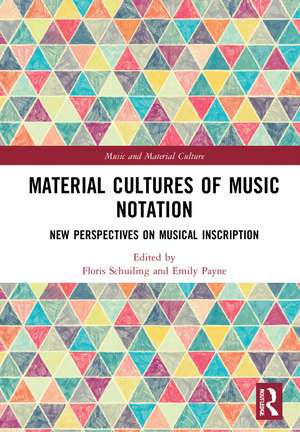Material Cultures of Music Notation: New Perspectives on Musical Inscription: Music and Material Culture
Editat de Floris Schuiling, Emily Payneen Limba Engleză Paperback – 29 ian 2024
| Toate formatele și edițiile | Preț | Express |
|---|---|---|
| Paperback (1) | 259.98 lei 6-8 săpt. | |
| Taylor & Francis – 29 ian 2024 | 259.98 lei 6-8 săpt. | |
| Hardback (1) | 1004.41 lei 6-8 săpt. | |
| Taylor & Francis – 17 mai 2022 | 1004.41 lei 6-8 săpt. |
Preț: 259.98 lei
Preț vechi: 311.41 lei
-17% Nou
Puncte Express: 390
Preț estimativ în valută:
49.75€ • 51.75$ • 41.07£
49.75€ • 51.75$ • 41.07£
Carte tipărită la comandă
Livrare economică 14-28 aprilie
Preluare comenzi: 021 569.72.76
Specificații
ISBN-13: 9781032260266
ISBN-10: 1032260262
Pagini: 230
Ilustrații: 92
Dimensiuni: 174 x 246 mm
Greutate: 0.45 kg
Ediția:1
Editura: Taylor & Francis
Colecția Routledge
Seria Music and Material Culture
Locul publicării:Oxford, United Kingdom
ISBN-10: 1032260262
Pagini: 230
Ilustrații: 92
Dimensiuni: 174 x 246 mm
Greutate: 0.45 kg
Ediția:1
Editura: Taylor & Francis
Colecția Routledge
Seria Music and Material Culture
Locul publicării:Oxford, United Kingdom
Public țintă
PostgraduateNotă biografică
Floris Schuiling is Assistant Professor at Utrecht University. His areas of expertise are modern and contemporary music in the Netherlands, especially improvised and experimental music, and the role of technology and material culture in musical creativity,with a focus on performance practices.
Emily Payne is Lecturer in Music at the University of Leeds. Her research interests include performance studies (particularly of post-war music), creativity, collaboration, embodiment, and materiality.
Emily Payne is Lecturer in Music at the University of Leeds. Her research interests include performance studies (particularly of post-war music), creativity, collaboration, embodiment, and materiality.
Cuprins
Chapter One: Introduction: Notation and/as material culture
Floris Schuiling and Emily Payne
Part I: Epistemologies of notation
Chapter Two: Was 1974 the End of Music History? Universalism, cybernetics, and the International Conference of New Musical Notation
Giulia Accornero
Chapter Three: Encyclopaedias and empty staves: Re-reading music in Hanne Darboven’s Quartett ›88‹
Elaine Fitz Gibbon
Chapter Four: Scoring the listener: Notation and representation in acousmatic music
Patrick Valiquet
Part II: Notation and the body
Chapter Five: The Deaf body beyond music: Music notation by Christine Sun Kim
Chae-Lin Kim
Chapter Six: Music, notation, and embodiment in early sixteenth-century Italian pictures
Tim Shephard and Sanna Raninen
Chapter Seven: The work of notation in the visual culture of medieval devotion
Beth Williamson
Part III: Notation and social relations
Chapter Eight: Jianpu simplified notation and the transnational in musical repertoires of New York’s Chinatown
Joseph S. Kaminski
Chapter Nine: Mediating minstrelsy: Notating instrumental identity in fourteenth-century song
David Maw
Chapter Ten: Inscription, gesture, and social relations: Notation in Karnatak music
Lara Pearson
Part IV: Notation, instruments, and technology
Chapter Eleven: Digital scores, algorithmic agents, and encoded ontologies: On the objects of musical computation
Brian A. Miller
Chapter Twelve: Perforating the subject: The player piano rolls of Conlon Nancarrow
Naomi Woo
Chapter Thirteen: Material bias: David Tudor’s realisations
You Nakai
Chapter Fourteen: ‘I Feel Love’: Music mutation in the electronic age
Kiene Brillenburg Wurth
Floris Schuiling and Emily Payne
Part I: Epistemologies of notation
Chapter Two: Was 1974 the End of Music History? Universalism, cybernetics, and the International Conference of New Musical Notation
Giulia Accornero
Chapter Three: Encyclopaedias and empty staves: Re-reading music in Hanne Darboven’s Quartett ›88‹
Elaine Fitz Gibbon
Chapter Four: Scoring the listener: Notation and representation in acousmatic music
Patrick Valiquet
Part II: Notation and the body
Chapter Five: The Deaf body beyond music: Music notation by Christine Sun Kim
Chae-Lin Kim
Chapter Six: Music, notation, and embodiment in early sixteenth-century Italian pictures
Tim Shephard and Sanna Raninen
Chapter Seven: The work of notation in the visual culture of medieval devotion
Beth Williamson
Part III: Notation and social relations
Chapter Eight: Jianpu simplified notation and the transnational in musical repertoires of New York’s Chinatown
Joseph S. Kaminski
Chapter Nine: Mediating minstrelsy: Notating instrumental identity in fourteenth-century song
David Maw
Chapter Ten: Inscription, gesture, and social relations: Notation in Karnatak music
Lara Pearson
Part IV: Notation, instruments, and technology
Chapter Eleven: Digital scores, algorithmic agents, and encoded ontologies: On the objects of musical computation
Brian A. Miller
Chapter Twelve: Perforating the subject: The player piano rolls of Conlon Nancarrow
Naomi Woo
Chapter Thirteen: Material bias: David Tudor’s realisations
You Nakai
Chapter Fourteen: ‘I Feel Love’: Music mutation in the electronic age
Kiene Brillenburg Wurth
Descriere
Material Cultures of Music Notation brings together a collection of essays that explore an essential question in the current landscape of musicology: how can writing and reading music be understood as concrete, material practices in a wider cultural context?







